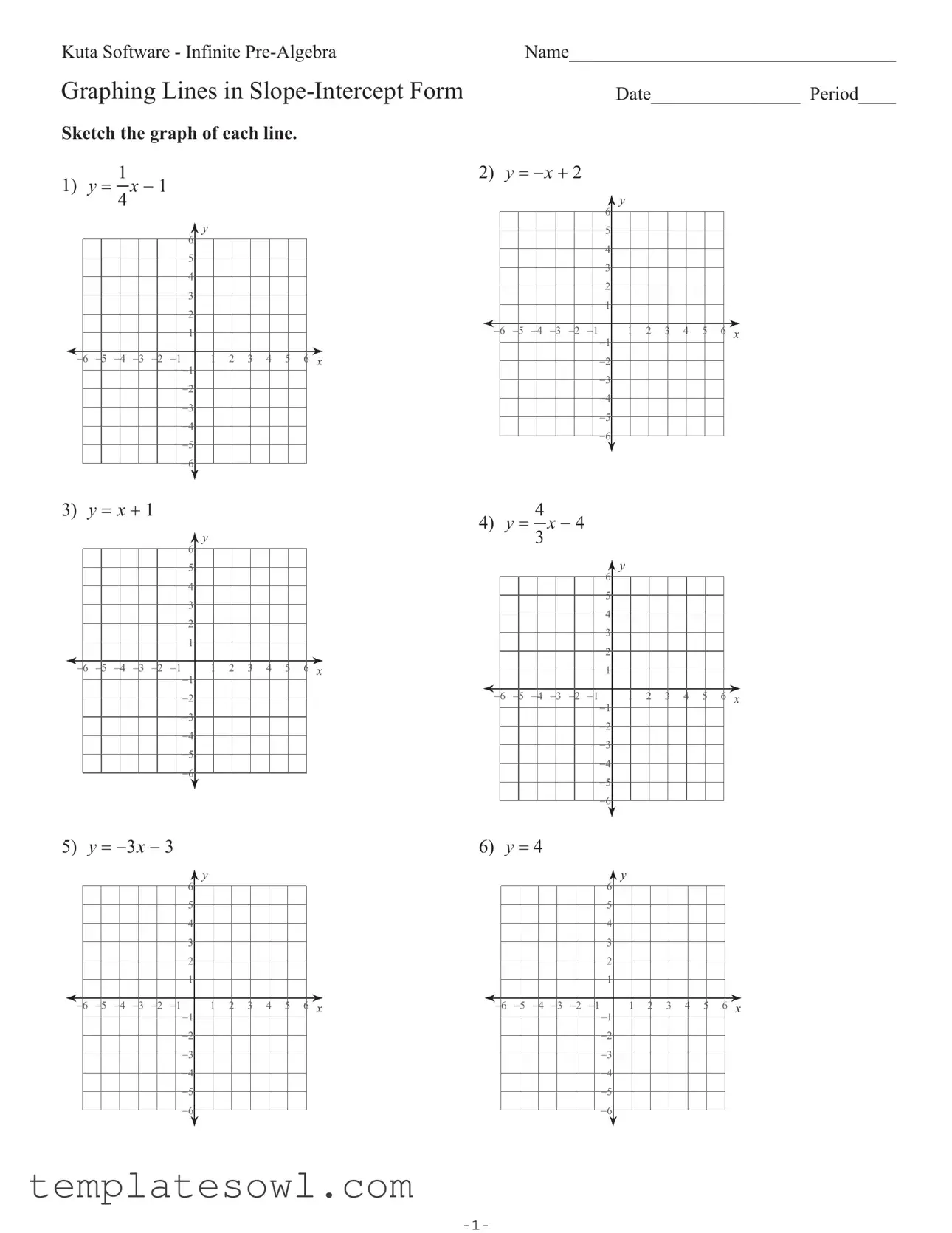Fill Out Your Kuta Software Infinite Pre Algebra Form
The Kuta Software Infinite Pre-Algebra form is a versatile educational tool designed for students who are mastering essential algebra concepts, particularly graphing lines in slope-intercept form. This form lays out a series of tasks that challenge learners to sketch the graphs of different linear equations, ultimately enhancing their understanding of how slope and y-intercept interact visually on a coordinate plane. Notably, the exercises require the identification of the components of each equation, fostering analytical skills as students convert mathematical expressions into graphical representations. Each worksheet encourages individual exploration, with ample space provided for students to work through the problems, allowing for a hands-on approach that caters to diverse learning styles. The form not only serves as a homework resource but also as a practice tool that can solidify skills in a classroom or home setting. For educators, the ability to create customized worksheets enhances flexibility in lesson planning while meeting specific curriculum requirements, making it easier to address varied student needs. A free trial is available at KutaSoftware.com for those interested in incorporating these resources into their teaching strategies.
Kuta Software Infinite Pre Algebra Example
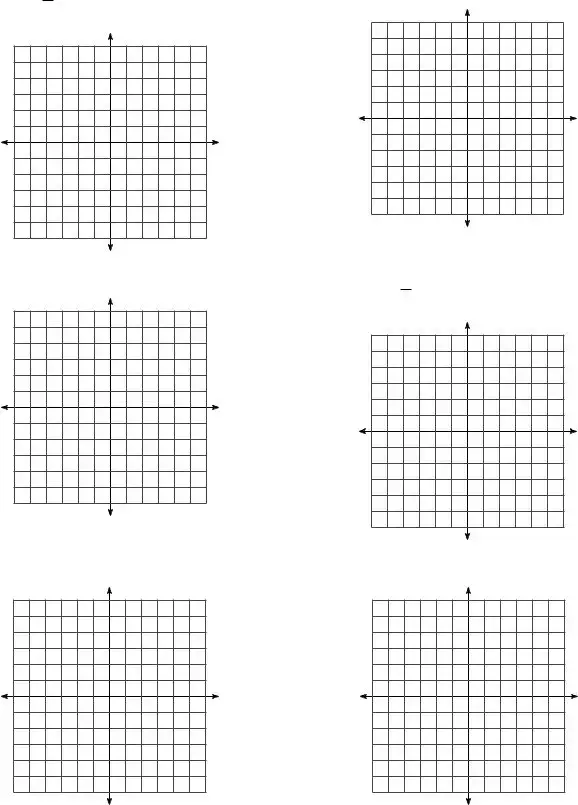
Kuta Software - Infinite |
Name___________________________________ |
Graphing Lines in |
Date________________ Period____ |
Sketch the graph of each line.
1) |
y |
x |
|
|
|
||
|
|
|
|
|
|
|
y |
x |
|||||||
|
|
|
|
|
|
||
|
|
|
|
|
|
|
|
|
|
|
|
|
|
|
|
|
|
|
|
|
|
|
|
|
|
|
|
|
|
|
|
|
|
|
|
|
|
|
|
|
|
|
|
|
|
|
|
3) |
y |
x |
|
|
|
|
|
|
|
|
|
|
|
|
y |
|
x |
|
|
||
|
|
|
|
|
|
|
|
|
|
|
|
|
|
|
|
|
5) |
y |
x |
|
|
|
||
|
|
|
|
|
|
|
y |
x |
|||||||
|
|
|
|
|
|
||
|
|
|
|
|
|
|
|
|
|
|
|
|
|
|
|
|
|
|
|
|
|
|
|
|
|
|
|
|
|
|
|
|
|
|
|
|
|
|
|
|
|
|
|
|
|
|
|
2) |
y |
x |
|
|
|
||
|
|
|
|
|
|
|
y |
x |
|||||||
|
|
|
|
|
|
||
|
|
|
|
|
|
|
|
|
|
|
|
|
|
|
|
|
|
|
|
|
|
|
|
|
|
|
|
|
|
|
|
|
|
|
|
|
|
|
|
|
|
|
|
|
|
|
|
4) |
y |
x |
|
|
|
||
|
|
|
|
|
|
|
y |
x |
|||||||
|
|
|
|
|
|
||
|
|
|
|
|
|
|
|
|
|
|
|
|
|
|
|
|
|
|
|
|
|
|
|
|
|
|
|
|
|
|
|
|
|
|
|
|
|
|
|
|
|
|
|
|
|
|
|
6) |
y |
|
|
|
|
|
|
|
|
|
|
|
|
|
y |
x |
|||||||
|
|
|
|
|
|
||
|
|
|
|
|
|
|
|
|
|
|
|
|
|
|
|
|
|
|
|
|
|
|
|
|
|
|
|
|
|
|
|
|
|
|
|
|
|
|
|
|
|
|
|
|
|
|
|
|
|
|
|
|
|
|
|
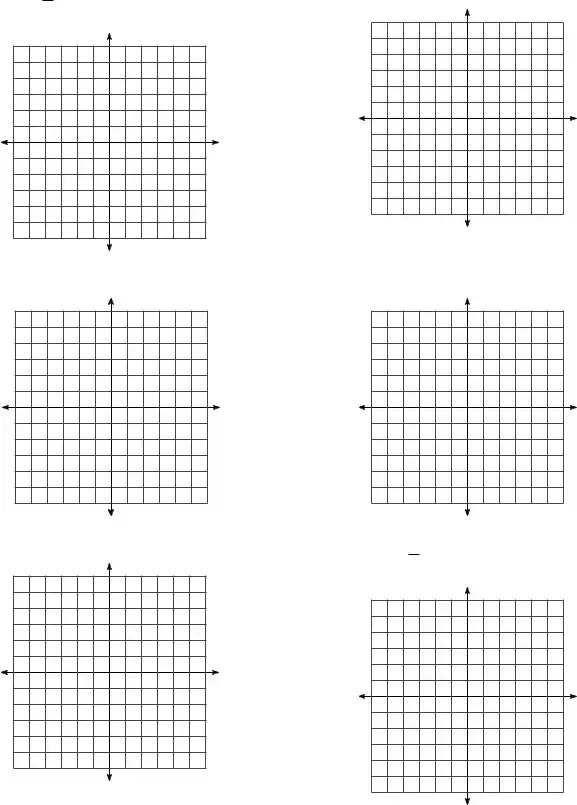
7) |
y |
x |
|
|
|
||
|
|
|
|
|
|
|
y |
x |
|||||||
|
|
|
|
|
|
||
|
|
|
|
|
|
|
|
|
|
|
|
|
|
|
|
|
|
|
|
|
|
|
|
|
|
|
|
|
|
|
|
|
|
|
|
|
|
|
|
|
|
|
|
|
|
|
|
9) |
y |
|
|
|
|
|
|
|
|
|
|
|
|
|
y |
|
x |
|
|
||
|
|
|
|
|
|
|
|
|
|
|
|
|
|
|
|
|
11) |
y |
x |
|
|
|
||
|
|
|
|
|
|
|
y |
x |
|||||||
|
|
|
|
|
|
||
|
|
|
|
|
|
|
|
|
|
|
|
|
|
|
|
|
|
|
|
|
|
|
|
|
|
|
|
|
|
|
|
|
|
|
|
|
|
|
|
|
|
|
|
|
|
|
|
8) |
x |
|
|
|
|
|
|
|
|
|
|
|
|
|
y |
x |
|||||||
|
|
|
|
|
|
||
|
|
|
|
|
|
|
|
|
|
|
|
|
|
|
|
|
|
|
|
|
|
|
|
|
|
|
|
|
|
|
|
|
|
|
|
|
|
|
|
|
|
|
|
|
|
|
|
10) |
y |
x |
|
|
|
||
|
|
|
|
|
|
|
y |
x |
|||||||
|
|
|
|
|
|
||
|
|
|
|
|
|
|
|
|
|
|
|
|
|
|
|
|
|
|
|
|
|
|
|
|
|
|
|
|
|
|
|
|
|
|
|
|
|
|
|
|
|
|
|
|
|
|
|
12) |
y |
|
x |
|
|
|
|
|
|
|
|
|
|
|
y |
x |
|||||||
|
|
|
|
|
|
||
|
|
|
|
|
|
|
|
|
|
|
|
|
|
|
|
|
|
|
|
|
|
|
|
|
|
|
|
|
|
|
|
|
|
|
|
|
|
|
|
|
|
|
|
|
|
|
|
|
|
|
|
|
|
|
|
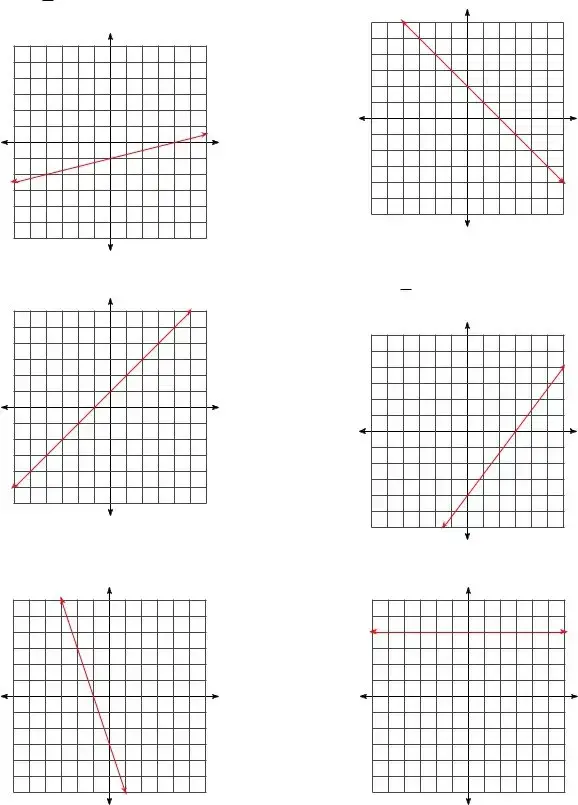
Kuta Software - Infinite |
Name___________________________________ |
Graphing Lines in |
Date________________ Period____ |
Sketch the graph of each line.
1) |
y |
x |
|
|
|
||
|
|
|
|
|
|
|
y |
x |
|||||||
|
|
|
|
|
|
||
|
|
|
|
|
|
|
|
|
|
|
|
|
|
|
|
|
|
|
|
|
|
|
|
|
|
|
|
|
|
|
|
|
|
|
|
|
|
|
|
|
|
|
|
|
|
|
|
3) |
y |
x |
|
|
|
|
|
|
|
|
|
|
|
|
y |
|
x |
|
|
||
|
|
|
|
|
|
|
|
|
|
|
|
|
|
|
|
|
5) |
y |
x |
|
|
|
||
|
|
|
|
|
|
|
y |
x |
|||||||
|
|
|
|
|
|
||
|
|
|
|
|
|
|
|
|
|
|
|
|
|
|
|
|
|
|
|
|
|
|
|
|
|
|
|
|
|
|
|
|
|
|
|
|
|
|
|
|
|
|
|
|
|
|
|
2) |
y |
x |
|
|
|
||
|
|
|
|
|
|
|
y |
x |
|||||||
|
|
|
|
|
|
||
|
|
|
|
|
|
|
|
|
|
|
|
|
|
|
|
|
|
|
|
|
|
|
|
|
|
|
|
|
|
|
|
|
|
|
|
|
|
|
|
|
|
|
|
|
|
|
|
4) |
y |
x |
|
|
|
||
|
|
|
|
|
|
|
y |
x |
|||||||
|
|
|
|
|
|
||
|
|
|
|
|
|
|
|
|
|
|
|
|
|
|
|
|
|
|
|
|
|
|
|
|
|
|
|
|
|
|
|
|
|
|
|
|
|
|
|
|
|
|
|
|
|
|
|
6) |
y |
|
|
|
|
|
|
|
|
|
|
|
|
|
y |
x |
|||||||
|
|
|
|
|
|
||
|
|
|
|
|
|
|
|
|
|
|
|
|
|
|
|
|
|
|
|
|
|
|
|
|
|
|
|
|
|
|
|
|
|
|
|
|
|
|
|
|
|
|
|
|
|
|
|
|
|
|
|
|
|
|
|
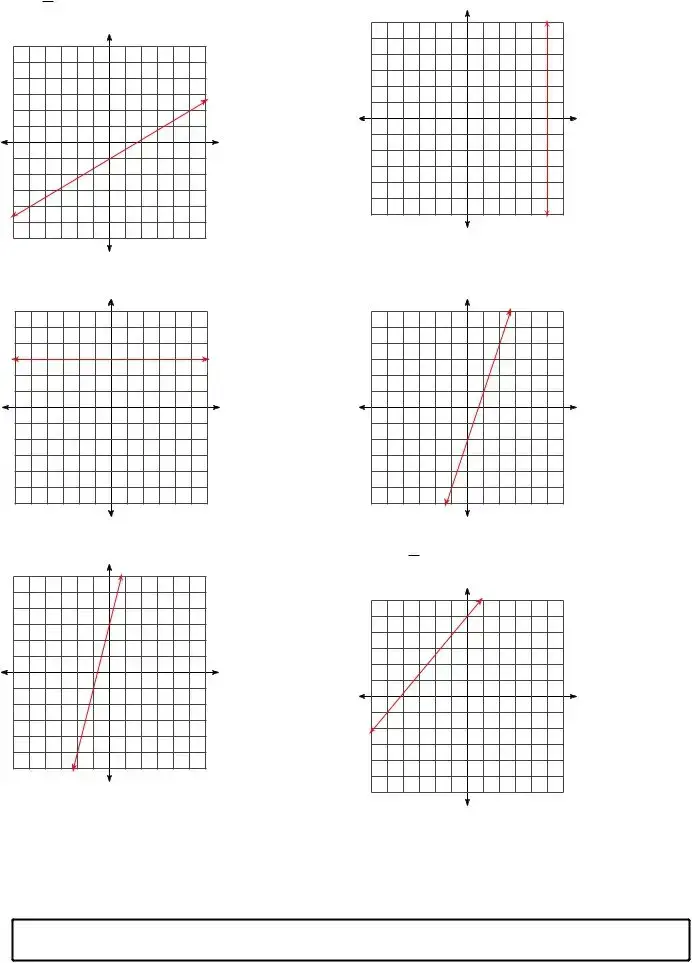
7) |
y |
x |
|
|
|
||
|
|
|
|
|
|
|
y |
x |
|||||||
|
|
|
|
|
|
||
|
|
|
|
|
|
|
|
|
|
|
|
|
|
|
|
|
|
|
|
|
|
|
|
|
|
|
|
|
|
|
|
|
|
|
|
|
|
|
|
|
|
|
|
|
|
|
|
9) |
y |
|
|
|
|
|
|
|
|
|
|
|
|
|
y |
|
x |
|
|
||
|
|
|
|
|
|
|
|
|
|
|
|
|
|
|
|
|
11) |
y |
x |
|
|
|
||
|
|
|
|
|
|
|
y |
x |
|||||||
|
|
|
|
|
|
||
|
|
|
|
|
|
|
|
|
|
|
|
|
|
|
|
|
|
|
|
|
|
|
|
|
|
|
|
|
|
|
|
|
|
|
|
|
|
|
|
|
|
|
|
|
|
|
|
8) |
x |
|
|
|
|
|
|
|
|
|
|
|
|
|
y |
x |
|||||||
|
|
|
|
|
|
||
|
|
|
|
|
|
|
|
|
|
|
|
|
|
|
|
|
|
|
|
|
|
|
|
|
|
|
|
|
|
|
|
|
|
|
|
|
|
|
|
|
|
|
|
|
|
|
|
10) |
y |
x |
|
|
|
||
|
|
|
|
|
|
|
y |
x |
|||||||
|
|
|
|
|
|
||
|
|
|
|
|
|
|
|
|
|
|
|
|
|
|
|
|
|
|
|
|
|
|
|
|
|
|
|
|
|
|
|
|
|
|
|
|
|
|
|
|
|
|
|
|
|
|
|
12) |
y |
|
x |
|
|
|
|
|
|
|
|
|
|
|
y |
x |
|||||||
|
|
|
|
|
|
||
|
|
|
|
|
|
|
|
|
|
|
|
|
|
|
|
|
|
|
|
|
|
|
|
|
|
|
|
|
|
|
|
|
|
|
|
|
|
|
|
|
|
|
|
|
|
|
|
Create your own worksheets like this one with Infinite
Form Characteristics
| Fact Name | Description |
|---|---|
| Product Overview | Kuta Software - Infinite Pre-Algebra is a tool designed to help students practice algebra concepts, particularly graphing lines using slope-intercept form. |
| Usage | The form aims to assist learners in sketching graphs based on given linear equations. Each worksheet features several prompts for practice. |
| Target Audience | Primarily, this resource targets middle and high school students who are currently enrolled in algebra courses. |
| Customization | Users can create their own worksheets tailored to specific topics or learning objectives, enhancing the learning experience further. |
| Free Trial | Kuta Software offers a free trial, allowing educators and students to explore its features before making a financial commitment. |
| Accessibility | Access to the infinite problem generator is available online, making it convenient for users to obtain and print worksheets as needed. |
| Compliance | This educational tool aligns with commonly accepted educational standards in mathematics across various states, although it may not be regulated by specific state laws. |
Guidelines on Utilizing Kuta Software Infinite Pre Algebra
To complete the Kuta Software Infinite Pre-Algebra form, follow the steps carefully. This form includes fields for entering student information and sections for sketching graphs of equations. Start by gathering the necessary supplies to ensure a smooth process.
- Write your name in the designated area for Name.
- Fill in the Date next to the corresponding label.
- Enter your Period number in the space provided.
- Locate the equations listed on the form. Each equation will correspond to a line that you will graph.
- For each equation, use graph paper or a plotting tool to sketch the graph accurately.
- After graphing each line, review your work for completeness and accuracy.
- Ensure that all fields are filled out before submitting the form to your instructor.
What You Should Know About This Form
What is Kuta Software Infinite Pre-Algebra?
Kuta Software Infinite Pre-Algebra is an educational tool designed to assist students and teachers in practicing pre-algebra concepts. It offers a variety of exercises, including graphing lines in slope-intercept form, helping learners to grasp foundational math skills. Users can create customized worksheets tailored to their learning needs, making it a versatile resource for different educational settings.
How can I use the infinite pre-algebra form for graphing?
To use the Kuta Software Infinite Pre-Algebra for graphing, simply fill in the provided equations in slope-intercept form. Each line will have its own set of values to plot. Sketch the graph directly on the provided grid or on a separate piece of graph paper. This will allow you to visualize the relationships between the variables in various equations. Practicing these exercises will enhance your understanding and skills related to graphing linear equations.
Is there a trial version of Kuta Software Infinite Pre-Algebra?
Yes, Kuta Software offers a free trial of the Infinite Pre-Algebra program. This trial features limited access to the tool’s full capabilities, allowing users to explore the functions available before making a purchase. During this trial, you can experience how customizing worksheets and practicing math exercises can significantly benefit your learning experience.
Are there resources for teachers using Infinite Pre-Algebra?
Absolutely! Kuta Software provides various resources specifically designed for teachers. These resources include lesson plans, tips for integrating the software into classroom activities, and access to a community of educators for support. Teachers can also utilize the customizable worksheet feature to create focused assignments that suit their students’ learning pace and style.
What topics can I practice with Kuta Software Infinite Pre-Algebra?
The Infinite Pre-Algebra program covers a wide range of topics, including but not limited to graphing lines, solving equations, working with inequalities, and manipulating algebraic expressions. By practicing these topics, students can build a solid foundation in pre-algebra that will serve them well in higher-level math courses.
Common mistakes
When filling out the Kuta Software Infinite Pre-Algebra form, many individuals encounter several common mistakes that can hinder their understanding and accuracy. One prevalent error is the failure to clearly write their name, date, or period at the top of the form. This information is crucial for teachers to track and associate student work with their performance, but its omission can create confusion.
Another mistake often made is skipping lines or not following the numbering of the problems. When students do not answer each question in order, it leads to disorganization of thoughts and answers. This can result in lost points as teachers may struggle to follow the student’s work.
Incorrectly identifying the slope and y-intercept is a frequent issue as well. When students misinterpret the coefficients in the slope-intercept form of the equation, they often sketch graphs that do not accurately represent the function. This not only affects their grade but also their comprehension of fundamental algebra concepts.
Furthermore, a lack of clarity in sketching the graphs can hinder effective communication of the student’s understanding. Mistakes such as labeling axes incorrectly or failing to plot points accurately can complicate the evaluation of their graphs. Visual representation is key in mathematics; thus, precision is paramount.
Many students also overlook the importance of utilizing a pencil rather than a pen when drawing graphs. Pencil allows for easy corrections, which can be indispensable during the drafting process. Graphs created with pen often do not allow for adjustments, leading to an inaccurate final submission.
Additionally, neglecting to check calculations is a common oversight. Students may rush through their work, leading to simple arithmetic errors that can skew their results. A quick review after finishing the graphing can often reveal mistakes that, if caught, may improve overall performance.
Persistent issues also arise when students do not clearly label their graphs. Without proper labeling, teachers and peers may misinterpret the information presented, reflecting poorly on the student’s knowledge. Clarity in communication is essential, especially in mathematical representations.
Lastly, many students fail to ask for help when needed. They may encounter a challenging aspect of the assignment but choose to push through without assistance. This reluctance to seek guidance can prevent them from mastering important concepts. Engaging with teachers or peers can provide insights that enhance understanding and performance in algebra.
Documents used along the form
When teaching pre-algebra, having a comprehensive set of resources is essential for effective learning. Many educators often pair the Kuta Software Infinite Pre-Algebra form with other documents to enhance students’ understanding of key concepts. Here’s a list of useful forms that complement the Kuta Software material.
- Algebra Practice Worksheets: These worksheets focus on a variety of algebra concepts, such as solving equations and simplifying expressions. They provide additional practice for students and reinforce what is taught in class.
- Graphing Calculator Tips: This guide offers instructions and tips for using graphing calculators effectively. It includes common functions and how to plot lines, which supports students in visualizing algebraic expressions.
- Formula Reference Sheet: This document contains essential algebraic formulas and properties. Having a quick reference can help students during tests or while doing assignments, making it easier to remember key formulas.
- Homework Assignment Sheets: These sheets outline specific homework tasks related to the material covered in class. They provide structure and ensure that all students know what is expected of them.
- Interactive Quiz Templates: These templates are ideal for creating quizzes that test understanding of slopes and intercepts. They can be used for formative assessments to gauge student progress.
- Study Guides: A well-structured study guide breaks down each topic and provides tips for mastering the material. It can be a valuable tool for review before tests or exams.
- Peer Review Forms: These forms facilitate peer assessments where students can evaluate each other's work. They encourage collaboration and help students learn from one another.
Using these documents alongside the Kuta Software Infinite Pre-Algebra form can create a well-rounded educational experience. Engaging with a variety of materials not only bolsters understanding but also fosters a deeper interest in mathematics.
Similar forms
Algebra Worksheets: Similar to the Kuta Software Infinite Pre-Algebra form, algebra worksheets contain problems for students to solve. They often focus on various topics such as factoring, equations, and graphing, providing practice for learners of different levels.
Graphing Practice Sheets: These documents, like the Kuta Infinite Pre-Algebra form, emphasize sketching graphs. They may include specific instructions on graphing different functions or lines, allowing students to practice their skills with a focus on visual representation.
Math Workbooks: Math workbooks are collections of exercises similar to the Kuta Software form. Students use them to develop their algebra skills through a variety of problems, often organized by concepts such as graphing and slopes.
Online Math Tools: Various online math programs offer similar features to the Kuta Software Infinite Pre-Algebra form. They allow for interactive learning and provide immediate feedback, making them useful for practicing graphing and other algebra concepts.
Slope Calculation Worksheets: These worksheets focus specifically on the concept of slopes in linear equations, akin to the slope-intercept exercises in the Kuta Software form. Students engage in calculating and understanding slopes through various exercises.
Practice Tests for Algebra: Another resource similar to the Kuta Software form is math practice tests. These tests assess students' understanding of algebraic concepts, including graphing, and are structured to prepare learners for higher-stakes assessments.
Dos and Don'ts
When filling out the Kuta Software Infinite Pre-Algebra form, consider the following tips:
- Do write your name clearly at the top of the form.
- Do ensure to fill in the date and period correctly.
- Do clearly sketch the graphs as instructed.
- Do check your work for accuracy before submitting.
- Don’t leave any questions unanswered.
- Don’t scribble or use fluid that can smudge.
- Don’t use pencil; use a pen for a clear presentation.
Following these guidelines will help ensure the form is filled out properly.
Misconceptions
Misconceptions about the Kuta Software Infinite Pre-Algebra form can lead to confusion for students and educators alike. Below are four common misunderstandings, along with clarifications.
- It’s only for advanced students. Many believe the Infinite Pre-Algebra form is solely designed for advanced learners. In reality, it accommodates various skill levels. It helps build foundational algebra skills through practice.
- It doesn’t offer guidance. Some think that the software is just a set of problems with no explanations. The truth is, Kuta Software provides numerous resources and examples to support understanding. Users can refer to these as they work through exercises.
- It requires special equipment. Another misconception is that certain technology is needed. The Infinite Pre-Algebra form is accessible on standard computers and devices. Any basic software setup can handle it.
- It’s only beneficial in the classroom. Many assume that this tool is only helpful during school hours. However, students can use it at home, too. It supports independent learning and extra practice, reinforcing what they learned in class.
Key takeaways
Filling out and using the Kuta Software Infinite Pre-Algebra form can enhance your learning experience significantly. Here are some key takeaways:
- Clear Instructions: The form provides straightforward prompts, making it easy to understand what is required for each graph.
- Practice Opportunity: This form serves as a valuable tool for practicing graphing lines in slope-intercept form, reinforcing key concepts.
- Organized Layout: The structured design helps you maintain focus, allowing for efficient work and reducing confusion.
- Custom Worksheet Creation: You can create personalized worksheets tailored to your learning pace using the Infinite Pre-Algebra program.
Using this form effectively can contribute to a solid grasp of algebraic concepts while also providing an opportunity for independent learning.
Browse Other Templates
Health Care Proxy Form - Your agent’s decisions will reflect your personal wishes once you are incapacitated.
Prudential 401k Loan - Documentation for your financial need must be submitted with your request to avoid rejection.
Michigan Special Mailer - Owners must sign the form to authorize the mailing of the title.
